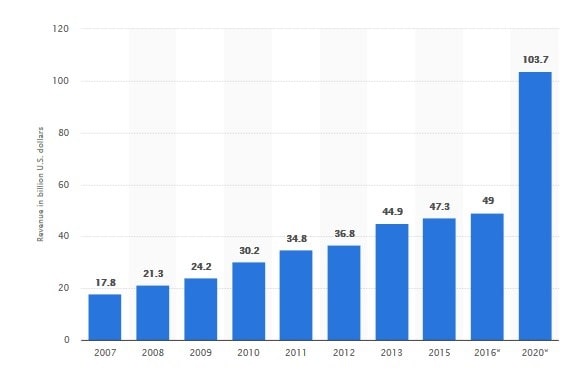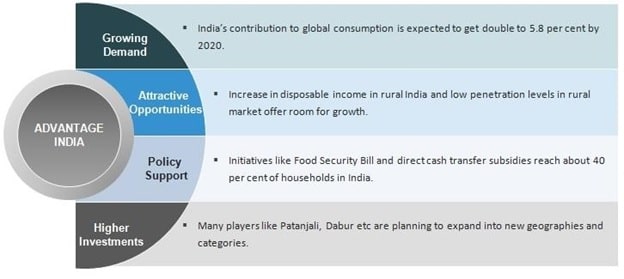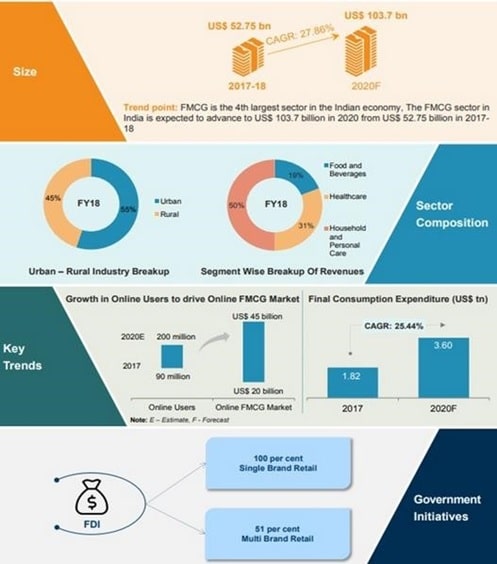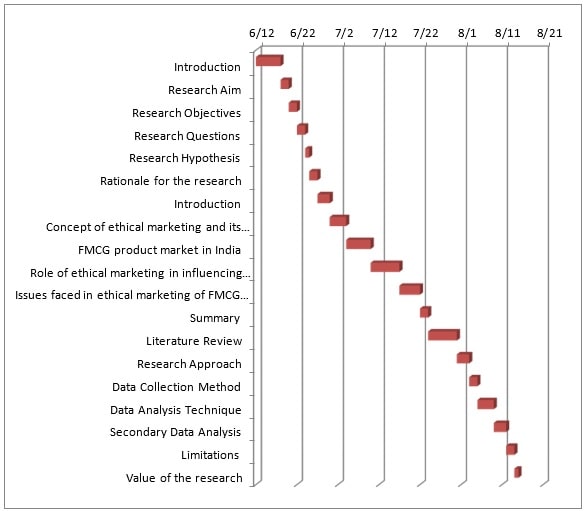Evolution Of Ethical Marketing Sample Assignment
Evolution of ethical marketing in last 10 year for FMCG (fast moving consumer goods) in India
1. Introduction and Research Objectives
1.0 Introduction
Fast Moving Consumer Goods, popularly known as FMCG, is the quickly retailed products at affordable prices, adding immense economic value to the gross domestic product of India. As per Jayanthi (2017), FMCG was regarded as the fourth largest sector of the Indian economy valued at US$49 billion as of 2016. Out of this share, personal care and household products dominated the sector with 50%, followed by healthcare sector at 32% and 18% of food and beverages products. One of the reasons for the success of the FMCG products in the Indian market is population dividend of the country along with growing urbanization and increase in the disposable income (Ibef.org, 2019). However, this sector witnesses immense competition with both domestic and international companies operating in this industry. Due to the immense pressure, every firm launches its marketing campaigns to resonate with the public and gain larger market share and profit rates. In this scenario, concerning the well-being of the people and adhering to government laws, the consideration of following a set of ethics in marketing domain has become a compulsion for the firms so that their promotional campaigns are not misleading. Therefore, the research would focus on the importance of ethical marketing in the context of FMCG products being retailed and promoted in India by tracking its evolution in the past ten years. A clear and well laid out set of objective would be stated that would govern the background of the study along with the choice of tools to gather relevant information and data.
1.1 Research Aim
The aim of the research study is to analyze the evolution of ethical marketing in the past ten years instead of the FMCG (fast moving consumer goods) being sold in the Indian markets.
1.2 Research Objectives
The research objectives are as follows:
- To understand the concept of ethical marketing
- To track the evolution of ethical marketing in the last 10 years in the context of FMCG products retailed in India
- To analyze the significance of ethical marketing in the purview of FMCG goods
- To identify the issues and make proper recommendations for enhancing the ethical marketing strategies used for FMCG retailing in India
1.3 Research Questions
The research questions are as follows:
- What is the ethical marketing as per the current trends?
- How has ethical marketing grown or gained importance in the last ten years in the promotion of FMCG goods in India?
- Why is ethical marketing significant in the purview of FMCG goods?
- What are the issues and its plausible recommendations for enhancing the ethical marketing strategies used for FMCG retailing in India?
1.4 Research Hypothesis
The research hypothesis for this study is:
H0: The concept of ethical marketing has not witnessed an evolution in the past ten years in the context of marketing FMCG products in India
H1: The concept of ethical marketing has witnessed an evolution in the past ten years in the context of marketing FMCG products in India
1.5 Rationale for the research
In the past, several instances were noted down where the advertisements and promotional campaigns run by the manufacturers and sellers of FMCG products were regarded to be misleading or persuasive in negative means for the consumers. The advertisements either promoted wrong messages, provided wrong benefits of the product or concealed important information leading to the consumers being duped. Therefore, this raised several questions on the marketing domain becoming a point of concern and an issue in the industry. On being investigated, the marketers cited pressure of competition and lack of standards governing promotional campaigns as a reason for developing such misleading advertisements. Owing to these problems, the concept of ethics was introduced in marketing wherein, the organizations and marketers were asked to abide by some morals and ethics while developing an advertisement campaign.
In the past decade, the concept of ethical marketing has grown and become much bigger with awareness among the consumers increasing. In the present times, the marketers have to be much more careful so that they do not offend their target audience in any manner by advertising anything that is not suited or concealing significant information about the product or the service. Therefore, in these conditions, understanding and tracking how the concept of ethical marketing became so significant and large would enrich the knowledge of the readers. As FMCG is the fastest growing and largest sector contributing to the Indian economy, tracking the evolution of ethical marketing in the past decade in the purview of this industry would provide for far better understanding along with the development of an understanding regarding the changes in the market, consumer perceptions and purchasing intentions in the last ten years.
2. Background (Review of Literature)
2.0 Introduction
The review of literature provides the readers with a backdrop of the topic and all the key terms to be used throughout the research. In this section, some literary pieces penned down in the past and available in the form of books, journals, website contents or newsletters would be presented and analysed for developing a strong background for the readers to encapsulate the research aim. The concept of ethical marketing, along with its growing importance in the present time, would be mentioned. Additionally, a discussion on the present fast moving consumer goods market in India would also be mentioned.
2.1 Concept of ethical marketing and its importance
As per Rajan (2016), marketing ethics is an area where the applied ethical considerations deal with the morality in principles implemented while regulating marketing activities. In other words, marketing ethics can be defined as the principles and values that a business or a marketer adhere to while engaging in promotional activities of a product or a service. Marketing ethics does not only benefit the company and society in the short-run but also bear fruits in the longterm.
Burns et al, (2014) state that, that there are certain principles and values in marketing that govern the definition of ethics adopted by them. The first ethical consideration made is honesty, wherein the marketers and manufacturers are bounded to disclose all the product and service related information to their customers in the campaign and not disguise or mislead them in any manner. The next principle is responsibility; the companies are expected to accept the consequences occurring from their marketing campaigns while still providing to customer needs by behaving in a manner that is positive for community and environment (Reddy, 2019). The next principle is of fairness, where the marketing domain is expected to strike a perfect balance between the seller’s interest and buyer’s needs and not exploit any of the parties for personal gains. Any kind of manipulation is not entertained, and just and fair behaviour is expected (Vassilikopoulou, 2019). Moving onto the next value is of respect, where the marketers have to show a basic level of respect towards human dignity and appreciate everyone’s efforts and contributions. Adding to the list of marketing ethics Murphy (2015) stated that transparency is also one of the important principles of ethical marketing where openness and proper flow of communication along with constructive criticisms are encouraged. Lastly, citizenship is also a principle of marketing ethics, where the marketers and manufacturers have to fulfil all legal, economic, societal and environmental bindings towards the stakeholders while protecting the society.
Advertisement and promotional campaigns have a significant impact on the consumers and their purchasing decisions, making the people preparing marketing campaigns to be ethically and morally more conscious. In the past, several advertisements have been run that are misleading and misguiding leading to having a negative impact on consumer’s health and well-being. For example, the promotional campaigns regarding weight-loss, anti-ageing and fairness creams often make false claims duping the customers. Therefore, in order to protect the interest of the consumers, the Indian government has launched a legal wing, named Advertising Standards Council of India (ASCI), in 1985 for screening the advertisements and marketing campaigns before them being launched for consumer view (Rawat et al., 2015). The board ensures that all the content used in marketing is truthful, fair and not offensive for any section of the society.
2.2 FMCG product market in India
The FMCG industry is considered to be one of the key contributors to the Indian GDP as it has become the fourth largest sector in India by witnessing a growth of 13.5% in the fiscal year of 2018 (Bhushan and Malviya, 2018). As per Patil (2017), the fast moving consumer goods sector provides employment to around 3 million people accounting for approximately 5% of the total factory employment in India. This industry is considered to be lucrative as it has low penetration levels because of the goods offered being consumed by all the strata of society. The sector is attributed with flexible and well-planned distribution channels, low operating costs, low rate of per capita consumption, simpler production process and large customer base.

Figure 1: Revenues of the FMCG sector in India between 2007 and 2020 (in billion US$)
(Source: Statista, 2019)
However, this sector is highly competitive, with innumerable firms striving to achieve a competitive advantage over one another. Within 2006 and 2013, the FMCG sector witnessed a phenomenal growth of 16%. Despite India witnessing a massive economic downturn during 2007-08, where the recession hit the markets badly, FMCG sector still grew. This growth is attributed to easier access, growing awareness among the consumers, increasing urbanization and change in the lifestyle patterns in the society. As compared to the rural segments, the urban segment contributes more to the FMCG revenue collection claiming a fair share of 55% (Ibef.org, 2019). As of 2017, the retail market of India was estimated to have a value of US$ 840 billion, with an expected annual growth of 20-25% per anum. If the growth rate were said to be as expected, then the market size of Indian retail sector by the year 2020 would be US$ 1.1 trillion. In terms of assessing, the size of the FMCG market in terms of revenues, the sector was valued at Indian INR 3.4 lakh crore as of fiscal year 2018with an estimated value of it to reach US$ 103.7 billion by 2020.

Figure 2: Reasons for India being a lucrative country for growth of FMCG
(Source: Ibef.org, 2019)
In terms of investment, ITC limited has made 60 more launches that are new in the Indian FMCG sector with Hindustan Foods Limited receiving an investment of US$ 22 million from Convergent Finance LLP. The government has also made a rule where the foreign investors have to invest minimum US$ 100 million in the Indian FMCG sector for operating.

Figure 3: Snapshot of Indian FMCG Sector
(Source: Ibef.org, 2019)
2.3 Role of ethical marketing in influencing consumer-buying decisions
The concept of marketing ethics has been a point of controversy for several years with marketers trying to understand the attitude and behavioural pattern of the consumers regarding their concerns on ethics. Carrigan and Attalla (2001), in his study, states that although immense research has been done on ethical marketing and its influence on firms and marketers, little research is available on the buyer’s aspect. Although consumers are regarded to be key stakeholders of the marketing exchange process, little information is available on their viewpoints regarding ethics era and expectations from the marketing campaigns (El Amrani and Correard, 2011).
However, Teece (2010) states that, with the internet being so easily available to the customers, the awareness levels among the people have increased with them being more informed and educated regarding the products being sold and its advantages. Therefore, in such scenarios, the marketers are expected to behave ethically and execute disclosure of all the product offerings. It has often been seen that consumers hold a positive attitude towards the companies that execute behaviour ethically as they develop a relationship of trust (Abacjournal.au.edu, 2019). The trust formed helps the companies to retain the customers and form long-term relationships. Moreover, the ethical considerations in marketing also help the brand in building brand equity that helps them in the long run and generates higher revenues and profit figures.
2.4 Issues faced in ethical marketing of FMCG products in India
The source of ethical issues in marketing arises from the lack of agreements or conflicts between the concerned parties. Every stakeholder involved in the marketing exchange process has certain expectations that he/she expects to be fulfilled at the end of the process and discontent in fulfilments leads to issues. The first ethical issue that marketers face is during market research. As FMCG products are fast moving, the changes in customer trends and tastes impact the sales of the product hence, forcing the companies to be adept with the changes and trends. In such a scenario, market research at regular intervals needs to be conducted. However, the marketing research being conducted is often condemned by certain sections of the society by terming it to be intrusive (Kotni, 2012). As the majority of the FMCG goods are products related to healthcare, household and personal care, consumers often do not entertain being questions on their preferences leading to marketers taking unethical ways of gathering information.
Another problem or ethical issues that the marketers face is during planning advertisements and promotional campaigns. The marketers have to be careful that the advertisements or promotional and marketing campaigns are not offensive or obscene and includes contain that would be useful for the society (Baker, 2014). Moreover, the marketers are also bounded by the responsibility and ethical consideration of not providing any kind of misleading information to their customers that would provoke them to buy the products. The campaigns should be honest containing reliable information with no content being included that would hurt the sentiments of any section of the society.
2.5 Summary
The literature review has been prepared after reviewing several scholarly articles, books, newsletters and website information. The section starts with discussing the concept of ethical marketing and its growing significance in the business world and consumer markets. After that, the growth of the FMCG market in India has been discussed wherein; it was stated that the industry grew by 13.8% in 2018. The role of ethical marketing along with the issues it faces during the execution phase, has been mentioned for understanding the reach and impact it has on the consumers, manufacturers and marketers.
3. Methodology
3.0 Literature Review
As mentioned above, for creating a literature review, the already published journals, books and website information available were reviewed. Several authors and organizations took the initiatives of undertaking marketing research and gathering information regarding the topics of ethical marketing, its significance, contribution to business growth and impact it has on the ethical decision-making process, consumer buying behaviour and marketer’s choice. Moreover, the information regarding FMCG markets and its position in the Indian economy was also scrutinized. Hence, for reviewing the market and the scope of ethical marketing in the last ten years, secondary data collection method would be used.
3.1 Research Approach
Every research requires the choice of an appropriate research philosophy complementing the aim and objectives of the study. The most common research philosophy used for a study is – realism, positivism and interpretivism. For this research, the positivism research philosophy would be adopted as it helps in gathering factual data (Bell et al., 2018). As the aim of the research is to track the evolution of ethical marketing in the past decade and to understand its role in FMCG industry of India, factual data regarding the growth phases and percentage change in trends would be required for which positivism philosophy would be the best suited.
During the consideration of the research approach, the two mostly used ones are – deductive and inductive. The deductive approach helps in understanding existing information and retaining knowledge. On the other hand, the inductive approach helps in the creation of new theories and innovative models that are in alignment with the objectives and research questions (Zikmund et al., 2013). For this research, the deductive approach would be adopted as the requirement is tracking down the changes in ethical marketing in the last ten years. The topic does not require the development of any new concept or models but analysis of existing market information and data.
3.2 Data Collection Method
The two most commonly used data collection techniques are primary and secondary. In the case of primary data collection method, the information is gathered by the researcher himself or herself from the market and audience. It involves first-hand data handling collected from the audience in raw form. However, in the case of secondary, the data and information are gathered from the literature available in relation to the topic and its periphery. For this study, the secondary data collection technique would be used as it seems to be more feasible (Saunders, 2011). As the evolution has to be tracked down in the past decade, primary data collection would not suffice the needs, as people would not be able to provide complete information. On the other hand, the secondary data collected from books, journals, websites, newsletters would furnish complete data about the last ten years, and the changes witnessed in marketing strategies of FMCG products in India.
3.3 Data Analysis Technique
The data analysis technique to be adopted for this research is qualitative. The qualitative technique complements the secondary research, as data would be gathered from existing literature. From the qualitative technique, the researcher would be able to evaluate the data gathered from the books and journals available in both theoretical and numerical form.
4. Limitations
The limitations of the study would restraint the scope of the research. The first limitation to be faced for this research is the time factor. The researcher is bound by time and hence, cannot make use of both primary and secondary data collection methods. However, using both methods would have been more advantageous as the researcher would have been able to validate the claims made by secondary research through the data gathered from primary techniques like interviews and surveys. Another limitation faced was finances. The researcher was limited in budget and did not have enough monetary support to carry out detailed research and access different online and offline libraries for evaluating a variety of books.
5. Value of the research
The research conducted would be significant as no study earlier divulged into the evolution of ethical marketing. The data and information available are mainly on ethical marketing and its challenges and impacts; however, details on its changing trends and growth phases are not available. Similarly, data on its impact on the FMCG products in the Indian market is not available, which this study would provide.
6. Timescale
|
List of Activities |
Duration |
|
Introduction |
6 |
|
Research Aim |
2 |
|
Research Objectives |
2 |
|
Research Questions |
2 |
|
Research Hypothesis |
1 |
|
Rationale for the research |
2 |
|
Introduction |
3 |
|
Concept of ethical marketing and its importance |
4 |
|
FMCG product market in India |
6 |
|
Role of ethical marketing in influencing consumer-buying decisions |
7 |
|
Issues faced in ethical marketing of FMCG products in India |
5 |
|
Summary |
2 |
|
Literature Review |
7 |
|
Research Approach |
3 |
|
Data Collection Method |
2 |
|
Data Analysis Technique |
4 |
|
Secondary Data Analysis |
3 |
|
Limitations |
2 |
|
Value of the research |
1 |

Reference List
Abacjournal.au.edu. (2019). [online] Available at: http://www.abacjournal.au.edu/2002/sep02/abacjournal_article01_sep02.pdf [Accessed 12 Jun. 2019].
Aikaterini Vassilikopoulou. (2019).
Baker, M.J., 2014. Marketing strategy and management. Macmillan International Higher Education.
Bell, E., Bryman, A. and Harley, B., 2018. Business research methods. Oxford university press.
Bhushan, R. and Malviya, S. (2018). Indian consumer products market sees 13.5% growth in FY18. [online] The Economic Times. Available at: https://economictimes.indiatimes.com/industry/cons-products/fmcg/indian-consumer-productsmarket-sees-13-5-growth-in-fy18/articleshow/63980595.cms?from=mdr [Accessed 12 Jun. 2019].
Burns, A.C., Bush, R.F. and Sinha, N., 2014. Marketing research (Vol. 7). Harlow: Pearson.
Carrigan, M. and Attalla, A., 2001. The myth of the ethical consumer–do ethics matter in purchase behaviour?. Journal of consumer marketing, 18(7), pp.560-578.
El Amrani, H. and Correard, S., 2011. The impact of marketing on customer’s behaviour:
Influence or manipulation?.
Ibef.org (2019). FMCG Industry in India: Sector Overview, Market Size & Growth | IBEF.
[online] Ibef.org. Available at: https://www.ibef.org/industry/fmcg.aspx [Accessed 12 Jun. 2019].
Ibef.org. (2019). [online] Available at: https://www.ibef.org/download/FMCG_060710.pdf [Accessed 12 Jun. 2019].
Jayanthi, D. (2017). Fast Moving Consumer Goods (FMCG) Sector in India: A study. International Journal Of Multidisciplinary Research And Development, 4(12), 91-97. Retrieved from http://www.allsubjectjournal.com/archives/2017/vol4/issue12/4-12-18
Kotni, D.P., 2012. Prospects and problems of Indian rural markets. ZENITH International Journal of Business Economics and Management Research, 2(3), pp.200-213.
Murphy, P.E., 2015. Marketing, Ethics of. Wiley Encyclopedia of Management, pp.1-4.
Patil, P.H., 2017. A comparative study of brand awareness among rural and urban consumers of Latur district. ZENITH International Journal of Multidisciplinary Research, 7(7), pp.16-24.
Rajan, P. (2016). MARKETING ETHICS. International Journal of Management and Applied Science, 2(11), pp.194-196.
Rawat, S.R., Bhatia, K., Hegde, M., Bhat, N. and Tewari, S., 2015. The Importance of Ethical Marketing Practices. Journal of Business Management and Economics, 3(2), pp.23-30.
Reddy, G. (2019). Ethical Challenges in Marketing. Journal of Business and Management, pp.48-50.
Reddy, G.H., Ethical Challenges in Marketing.
Saunders, M.N., 2011. Research methods for business students, 5/e. P
Statista. (2019). India FMCG market size 2020 | Statistic. [online] Available at: https://www.statista.com/statistics/419280/size-of-the-indian-fmcg-market/ [Accessed 12 Jun. 2019].
Teece, D.J., 2010. Business models, business strategy and innovation. Long range planning, 43(2-3), pp.172-194.
Zikmund, W.G., Babin, B.J., Carr, J.C. and Griffin, M., 2013. Business research methods.
Cengage Learning.


